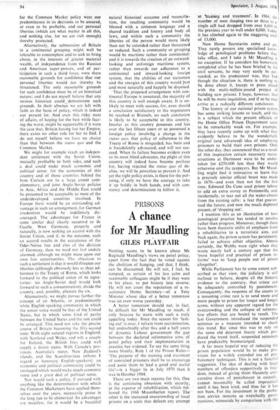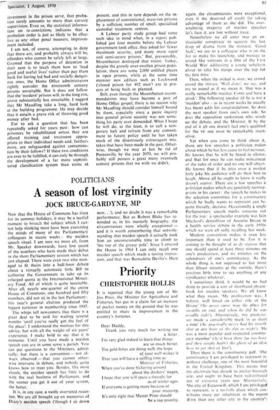PRISONS
A chance for Mr Maudling
GILES PLAYFAIR
Nothing seems to be known about Mr Reginald Maudling's views on penal policy, apart from the fact that he voted against the abolition of hanging, and that, I think, can be discounted. He will not, I feel, be tempted, as certain of his less calm and reasonable colleagues might be if they were in his place, to put history into reverse. He will not court the reputation of a re- actionary Home Secretary—of a Tory Minister whose idea of a better tomorrow was an even worse yesterday.
A better tomorrow should not, in fact, be difficult for Mr Maudling to reach, if only because he starts with such a truly appalling today. Since the season for 'lash- ing out' is over, I refrain from recrimination, but undoubtedly after five and a half years of dynamic Labour government the gap between the declared reformative aims of penal policy and their implementation in practice has widened. To say the same thing more bluntly, Rule 1 of the Prison Rules— 'The purpose of the training and treatment of convicted prisoners shall be to encourage , and assist them to lead a good and useful life'—is a bigger lie in July 1970 than it was in October 1964.
There are two main reasons for this. One is the continuing obsession with security, at the expense of rehabilitation, which fol- lowed the 1966 Mountbatten report. The other is the increased overcrowding of local prisons on a scale that defeats any attempt
at 'training and treatment'. In 1964, the number of men sleeping two or three to a single cell had dropped from over 8,000 in the previous year to well under 6,000. Today it has climbed again to the staggering total of 13,000.
Now Home Secretaries come and go. They rarely possess any specialised know.
ledge of penological problems before they take office, and I take it Mr Maudling is no exception. If he considers his homework
completed after he has been briefed by his civil servants, he may very easily be per- sitaded, as his predecessor was, that bad though the situation is, there is nothing to be done about it, except to press ahead with the multi-million-pound project of
building new prisons. I hope, however, that he will be more inquisitive, and if so he may arrive at a radically different conclusion.
The history of our national prison system has some striking lessons to teach, and this is a subject which the present officials of the Home Office Prison Department seem to be remarkably weak on. For example, they have recently come up with what they
evidently believe to be the wonderfully original (and advanced) idea of employing
prisoners to build their own prisons. Only the other day, they announced that as a result of this inspiration certain necessary recon- structions at Dartmoor were to be under-
taken for £250,000 less than they would
otherwise cost the taxpayers. But Mr Maud- ling might find it instructive to learn that
a precisely similar official boast was made in 1870—and even then not for the first time. Edmund Du Cane used prison labour to add an extra storey to Pentonville and, incidentally, to tear out all the water-closets from the existing cells: a feat that guaran- teed the future, and now the much deplored present, of 'slopping out'.
I mention this as an illustration of how penological practice has tended to revolve
rather than progress. Moreover, though there
have been theoretic shifts of emphasis from a rehabilitative to a terroristic aim, and back again, the prison system has persistently failed to achieve either objective. Almost certainly, the Webbs were right when they wrote nearly half a century ago that the `most hopeful and practical of prison re- forms' was to 'keep people out of prison altogether'.
While Parliament has to some extent sub- scribed to that view, the judiciary is still
inclined to believe, despite all the ..historic
evidence to the contrary, that crime can be adequately controlled by punishment.
Consequently, the response of the courts to a mounting crime rate is to send more and more people to prison for longer and longer terms, without any apparent regard for the overcrowding and the collapse of reforma- tive efforts that are bound to result. The
last Government introduced the suspended sentence as a measure intended to check this trend. But since this was to rely on
the same old deterrent theory which pro- duced the -trend itself, suspended sentences have predictably boomeranged. A far more hopeful way of reducing the prison population would be to make pro- vision for a widely extended use of pro- bationary techniques. This is not a fanciful suggestion. The idea of dealing with large numbers of offenders supportively in free- dom, instead of giving them blatantly anti- curative doses of punishment in custody. cannot reasonably be called impractical until it has been tried, and thus far it has not been. For the investment in the proba- tion service remains so wretchedly parsi- monious, minuscule by comparison with the investment in the prison serve, that proba- tion rarely amounts to more than cursory supervision. Even so, the statistical informa- tion on re-convictions indicates that a probation order is just as likely to be effec, tive as any other penal measure, imprison-, ment included.
I am not, of course, attempting to deny that there are, and probably always will be, offenders who cannot be safely left at large. Granted that the purpose of detention in their case is to teach them how to 'lead good and useful lives' rather than pay them back for having led bad and socially danger. ous ones, the Home Office administrators rightly consider the nineteenth century prisons unsuitable. But it does not follow that the 'modern' prisons will, in the long run, prove substantially less unsuitable. I suggest that Mr Maudling take a long, hard look at the building programme. He may decide that it entails a grave risk of throwing good money after bad.
For to ask a question that has been repeatedly asked for years past: how can prisoners be rehabilitated unless they are offered training and treatment appro- priate to their individual needs and, further more, are safeguarded against contamina-E tion by their fellows? If these two conditions are ever to be fulfilled, it can only be through the development of a far more sophisti- cated classification system than exists at present, and this in turn depends on the re- placement of conventional, mass-run prisons by a sufficient number of small, specialised custodial treatment centres.
A Labour party study group-had some such idea in mind when, in a report pub- lished just four months before the Labour government took office, they asked for 'fewer maximum security, and many more open-- and semi-secure prisons.' But, presumably, Mountbatten destroyed that vision. Today, despite the grossly over-swollen prison popu- lation, there are some 2.000 unfilled places in open prisons, while at the same time monster new edifices such as Lockwood ('closed prison for 492 men') are in pro- cess of being built or planned.
Still, even though the Mountbatten recom- mendations may have become a part of Home Office gospel, there is no reason why Mr Maudling should consider himself bound by them, especially since a panic inquiry into general prison security was not some- thing his party ever demanded. What I hope he will do, at the least, is to call a tem- porary halt and refrain from any commit- ment to future policy until he has taken stock of the disastrously extravagant mis- takes that have been made in the past. Other- wise, though we may at last be rid of Pentonville by the year 2070, we will pro- bably still possess a great many twentieth century prisons that we wish we didn't,































 Previous page
Previous page